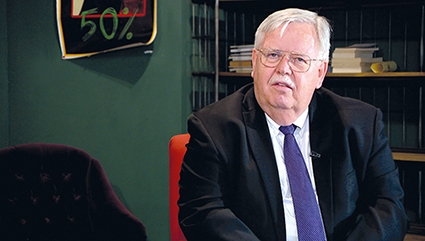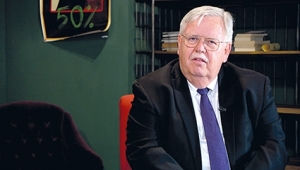Former Ambassador Tefft: From Tbilisi to Kyiv to Moscow
Exclusive Interview
FROM THE EDITOR: The Editor would like to apologize to Mr Tefft for misspelling his name in the printed issue of the newspaper.
In an exclusive interview with GEORGIA TODAY and Realpolitik Talk Show, the living legend of American diplomacy (there’s no other way to pay proper homage to the man who has served his country without blemish as an ambassador in Lithuania, Georgia, Ukraine and Russia.), John Tefft reminisced on his Georgian tenure, which happened to involve the 2008 August War. Being one of the speakers at a massive two-day conference in Tbilisi organized by the McCain Institute and Economic Policy Research center, Tefft charted his diplomatic journey in a speech aptly titled "From Vilnius to Tbilisi to Kyiv to Moscow.” When speaking about the 2008 war with us, the veteran diplomat stressed he didn’t have to strain his memory to recall who actually started the war, something a number of Georgian politicians, of a relatively younger age compared to the octogenarian US envoy, have been rather oblivious of.
When I interview people who were in Georgia in the 90s, they always note the difference between then and now. What differences do you see between how it was when you were here, and today?
Driving in from the airport, the first thing you notice is all the cars; the traffic is much worse, and beautiful downtown Tbilisi is getting more clogged up with traffic all the time. But that's also symptomatic of the US, as Washington is far worse now than it ever was. If you stop and think back to Georgia of 1991, and even in the years afterwards with the civil war and everything else, it's pretty amazing how much Georgia has achieved in a relatively short historical time; yes I know 20% of the population is below the poverty line and I've heard a lot of problems and various complaints made to the government, but this is still a democracy, the country is still improving, it has developed really good relations with the US and the West. It’s very fortunate that today an overwhelming number of Americans support Georgia and Ukraine in the struggle going on with Russia over territorial integrity.
Do you think it has to do with fortune or did Georgia earn it?
Georgia in most part earned it over a period of time, and I'm not singling out any particular president or government in this. I was pleased when several politicians from the different groups who spoke to us yesterday made the point that pro-Russia parties right now are made up by less than 10% of the population despite all the propaganda that gets bombarded on the Georgian people. I was pleased that not just politicians are determined to stay the course and to keep the Western path that this country has followed for the last 25 years.
What are your recollections of the 2008 August War?
I'll be honest with you: I'm in the process of trying to put together material for a book not just about that, so I’ll just say in general that you know it was clear to us in the run-up to August 2008 that the Russian side was bringing troops by rail, and there were other provocations. There was no question in my mind that that the conflict that developed was in effect precipitated by that pressure. Especially as you look back on that period now through the prism of the Russian actions in Ukraine, it's pretty clear that it was all part and parcel of a larger effort to reassert Russian control and influence in what the Russians call the near abroad.
Did the Russians catch you, the West, unaware?
No. We knew things were heating up and I can't say that I was surprised by it. Now whether people in Washington or the European capitals were, is hard for me to say, as I wasn't there, but the fact is that there were a lot of other things going on: it was the last year of the Bush administration and they were very much focused on Iraq and Afghanistan and it was also the time of the Olympics. At our embassy [in Tbilisi], we were very clear, and we reported as fully as we could to Washington on all the things we had observed Russia doing in Abkhazia and South Ossetia.
Could anything have been done to prevent it?
This is one of those what ifs that's really hard. There are some people who are critical of President Saakashvili for sending troops into Tskhinvali, the implication being that if he hadn't done so, then things would have been better. Former Secretary of State Condoleezza Rice recently reiterated in an article in The Washington Post that Lavrov [Sergey Viktorovich Lavrov, Foreign Minister of Russia] on the phone [at the time] said that even though the official propaganda line is that we want to help those poor Ossetians, to save our peacekeepers, we're trying to take down the government. They were trying to get a regime change and it was pretty clear from the facts on the ground that he admitted it and so I think the plan was to certainly move ahead along that line.
If, as you say, the prime intention of Russia was a regime change, should it not stop the discussion of who started the war?
To a certain extent you can make that point, but I've never had a question of who provoked the war in my own mind. A number of other things that have emerged since the war basically confirm that and, as I said before, if you look at the war in Georgia in the hindsight of what happened in Ukraine, it is pretty clear where the pattern is.
Regarding the normalization of relations with Russia, one of the tenets of the current government when it came to power; seen from your time in Moscow as an ambassador, do you think it succeeded?
Russia has to pull its troops out of both South Ossetia and Abkhazia. Calling them independent states is ridiculous and I think in order to normalize it, the Russian government really has to go back to a status quo ante. We have to try to find a way where the people in Ossetia and Abkhazia can come together with the Georgian people, where territorial integrity is restored and the rights of minorities as well as the majority of the people are all respected and observed; easier said than done, but I think that's the only way this is going to be solved.
By Vazha Tavberidze












